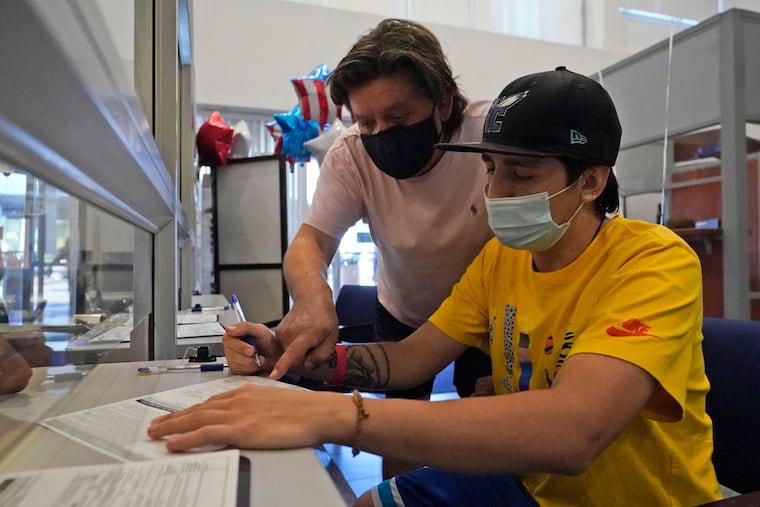A federal judge has denied a motion to extend Florida’s voter registration after site crashed
A federal judge has denied a motion to extend voter registration after a computer meltdown on the final day of registration.

TALLAHASSEE, Fla. — A federal judge has denied a motion to extend voter registration in Florida even though a computer meltdown on the final day of registration might have prevented thousands of potential voters from taking part in November’s presidential election.
In a 29-page ruling on Friday morning, U.S. District Court Judge Mark E. Walker said his decision was “an incredibly close call” but added that “the state’s interest in preventing chaos in its already precarious —and perennially chaotic — election outweighs the substantial burden imposed on the right to vote.”
Walker shared in the exasperation of voter advocacy groups even as he ruled against them, peppering his opinion with sharply worded criticisms of the state.
“In so ruling, this Court notes that every man who has stepped foot on the Moon launched from the Kennedy Space Center, in Florida. Yet, Florida has failed to figure out how to run an election properly—a task simpler than rocket science,” the judge wrote.
Secretary of State Laurel Lee reopened registrations for seven hours on Tuesday after consulting with Gov. Ron DeSantis, providing another opportunity to people who weren’t able to submit their voter registrations online before Monday night’s deadline. But Walker said this was too little, too late and done with not enough notice.
“With the public sounding the alarm, the Secretary of State decided to implement a half measure,” Walker wrote. “She hastily and briefly extended the registration period and ordered Florida’s supervisors of election to accept applications submitted by the Secretary’s new ‘book closing’ deadline.”
Walker wrote that Lee’s “cure” had at least one major flaw: She did not notify the public until after noon on the date of her new deadline.
“This left less than seven hours for potential voters to somehow become aware of the news and ensure that they properly submitted their voter registration applications, all while also participating in their normal workday, school, family, and caregiving responsibilities,” Walker wrote.
The final day of the registration period has historically been one of the busiest, as thousands of people register, requesting replacement voter cards or updating addresses and other voter information to be sure their ballots will be counted.
Lee, who oversees the voting system, said her office had put in additional servers to accommodate the heightened interest, but misconfigurations in the system prevented it from handling the surge.
Florida’s chief information officer, James Grant told The Associated Press that “the servers were configured in a way that reduced its capacity to a fraction of a fraction of what it was capable of,” and that while denying people opportunities to vote was not their intention, he acknowledged that the system failed on a critical day.
The Secretary of State’s Office said the system was overloaded by some 1.1 million requests per hour. During the peak of the slowdown, about 49,000 people were trying to access the system — many trying repeatedly to register without success.
Some gave up and never returned to register to vote despite Lee’s decision to reopen the registration period, said Cloe Cabrera, the spokesperson for Organize Florida, one of the groups that sued the state. Others might not have learned of the next day’s extension.
“We’re disappointed that so many Floridians were disenfranchised because of the state’s failure to upkeep the online voter registration system,” Cabrera said.
“A lot of folks who went to the website, which crashed, didn’t go back to the website and they won’t be able to exercise their democracy, which is very upsetting,” she said.
Dream Defenders, New Florida Majority, LatinoJustice PRLDEF and others who joined the lawsuit in Tallahassee said at least two additional days were needed to provide citizens with enough time to respond. Anything less would be voter suppression, they said.
The groups were considering an appeal, but with Election Day now less than four weeks away, that option might be impractical and sow further chaos into an election season already hampered by the coronavirus outbreak.
Florida’s online voter registration system serves the state’s 67 counties and became operational in October 2017. It has had a few hiccups over the years, but nothing like what happened Monday — the final day for potential voters to register for the November presidential election.
In the last seven hours of Monday, only about 8,100 people successfully accessed the system. Earlier in the day, more than 70,000 Floridians had been able to log on before the system slowed to a crawl at about 5 p.m.
Data filed by the state indicates that 50,000 people registered during the extended time period. Based on previous trends, the judge noted, perhaps more than 20,000 additional people might have also registered to vote, if they had been able to access the system.
A spokesman for DeSantis, Fred Piccolo, told the AP on Friday that “the governor took quick and decisive action to ensure voter access to multiple registration options including online, in person, or through the mail. There was no basis for federal courts to get involved and the governor expected this outcome.”
The judge, however, suggested that the failures gave DeSantis little to be proud of.
“This case is about how a state failed its citizens,” he wrote. “Potential voters attempted to perform their civic duty, to exercise their fundamental right, only to be thwarted, once again, by a state that seemingly is never prepared for an election.”
Frisaro reported from Fort Lauderdale, Florida.